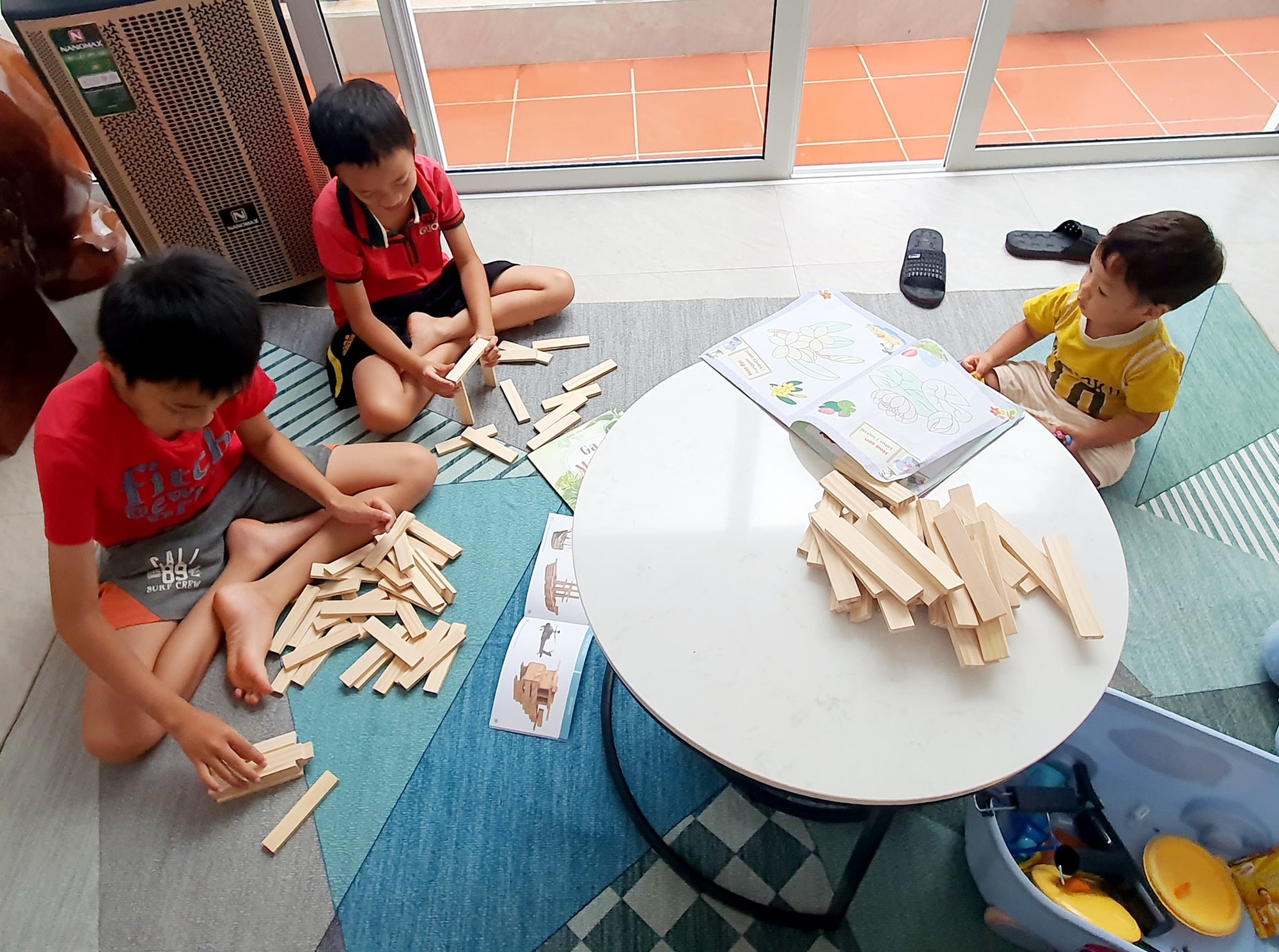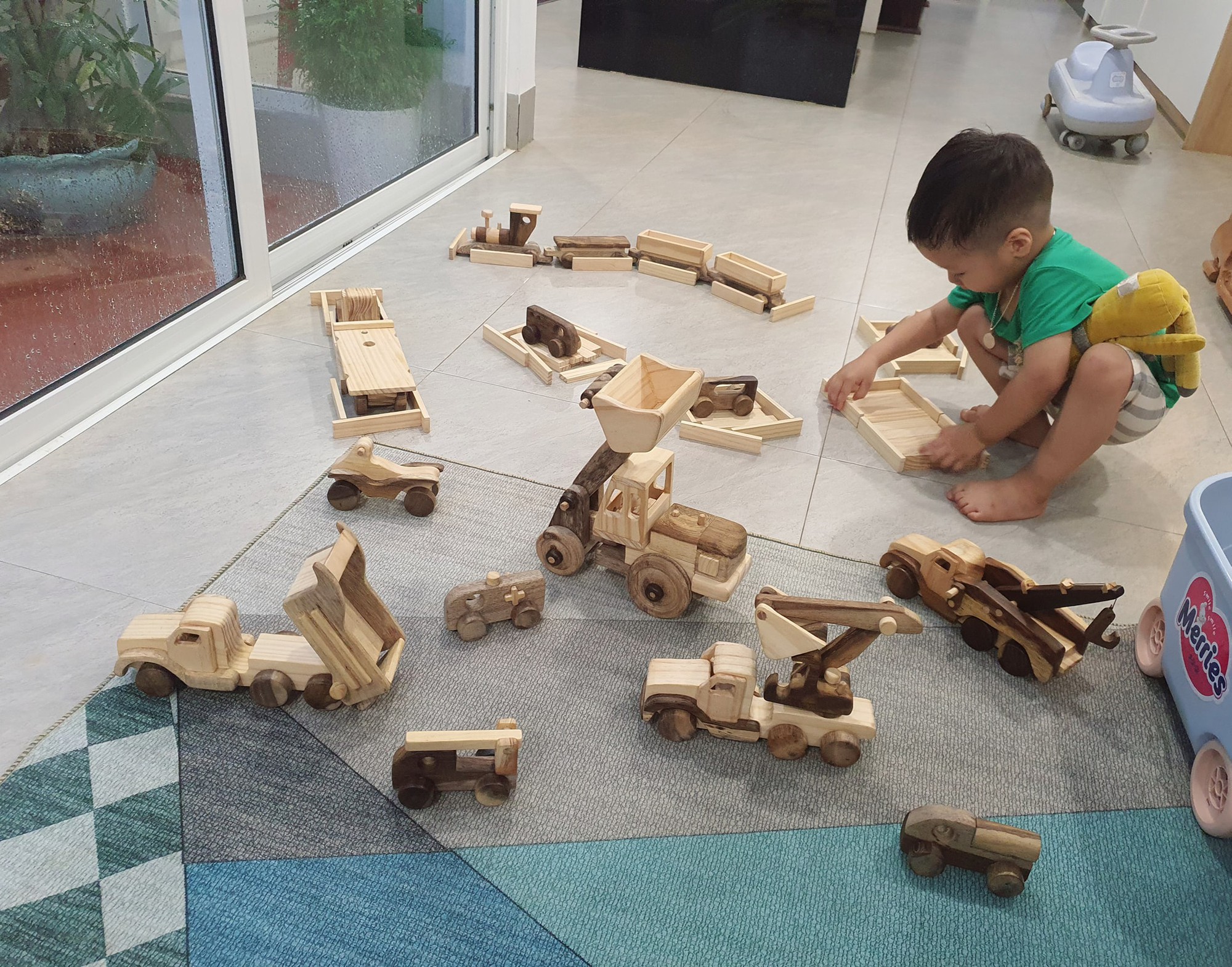Creating a Tech-Free Childhood through Everyday Activities
Although electronic devices are essential in the era of Industry 4.0, 80s mom still has her own ways to ensure her child has a childhood without dependence on them.
A child addicted to electronic devices is the result of direct parenting
Ms. Le Khanh (living in Buon Me Thuot, Dak Lak) is the mother of a nearly 3-year-old boy. When taking her child out to play, she often hears comments like:
– Your child is so good, can eat by himself, doesn’t need to look at the phone, right?
– Look at your child, he doesn’t use the phone.
– How can you prevent your child from playing with the phone?
– When can your child stop using the phone?
In reality, Ms. Khanh has never banned her child from using the phone, but she also doesn’t introduce the phone to her child as a toy. Her nearly 3-year-old baby knows that the phone is used for making calls, sending messages, taking photos, and recording videos. Occasionally, he might say, “”””Mom, take a picture,”””” or “”””Mom, call grandma,”””” but he has never demanded the phone as a toy.
“”””I think if a child becomes addicted to smart devices (TV, phone, iPad, etc.), it’s not the child’s fault; it’s an issue with the direct parenting,”””” Ms. Khanh remarked.
She often encounters viewpoints like these: “”””Children nowadays, they’re all like this! Kids these days start watching TV and using phones early, so they’re smarter; If you don’t let them use the phone or TV, they won’t eat! Nowadays, all parents use phones, so all kids are addicted to phones.””””
Ms. Khanh understands that this is the era of Industry 4.0, and the phone is an indispensable tool. She uses her phone for work a lot, and she knows that her child will need guidance on using the phone as a necessary tool, but not right now. She believes that if parents take the time to learn, they will realize that using smart devices too early is more harmful than beneficial.
“”””I don’t judge anyone because everyone has their own circumstances and life perspectives. I know many parents are too busy, so they hand their child a phone or turn on the TV to keep them still. I just hope that parents will seek understanding and determination to give their children a more complete childhood,”””” Ms. Khanh expressed her viewpoint.
Can Childhood Exist Without Smartphones?
Here are some experiences of Mr. and Mrs. Khanh in raising a child who is not dependent on smart devices:
1. Avoiding Screen Dependency
Our home doesn’t have a TV because both my husband and I have no desire to watch TV. As a result, our child has grown up without it. Instead, we have a large speaker connected to our phone to play music for our child while he plays and a small speaker with a memory card to play music before bedtime and read English books to our child. Our child has learned many songs in both English and Vietnamese without needing to rely on screen images.
2. Using Phones for Entertainment in Front of the Child
My husband and I don’t use our phones for entertainment (watching videos, playing games, etc.) in front of our child. Activities with images and sounds on the phone can be captivating for a child. We don’t tell our child that “”””playing with the phone is bad”””” or “”””using the phone too much harms your eyes”””” because we still need to use our phones in front of our child.
When at home with our child, we try to use our phones as little as possible. However, because there are many tasks that require us to use our phones, when we do need to use them, we say to our child, “”””Mommy will work for a bit, then I’ll play with you.”””” We try to work quickly because our child will urge us, saying, “”””Mom, put the phone away, don’t work anymore.””””

3. Limiting the Child’s Exposure to Phones
We allow our child to interact with a phone when making video calls to grandparents and relatives. However, this interaction is very limited, and our child doesn’t like talking on the phone as much as meeting in person. Our child was born during the pandemic, so there were limitations in meeting people in person. We still wanted to maintain a connection with everyone, so we made phone calls to grandparents and cousins to talk to our child. However, we realized that for our child, connecting through the phone is different from real life. When he was younger, he talked to his cousin on the phone every day and recognized him by his voice and image, but when he met him in person, he didn’t recognize him.
“”””4. Always Communicate with Your Child
Engage in conversations with your child whenever possible. Even when parents are working, take the opportunity to talk to your child and answer their questions (while checking what they are doing). When our child was a few months old, we often placed them in a stroller or a crib while we cooked, did household chores, and talked to them at the same time.
5. Allocate Daily Playtime with Your Child
Set aside time each day to play with toys together. Even if you’re busy, spending a short 10-15 minutes of quality time together, free from phone use or other distractions, is essential. We don’t have many toys at home, and we believe that what the child needs most is our presence and interaction, rather than specific toys. Fewer toys often stimulate a child’s creativity.
Schedule outdoor playtime with your child whenever you have free time. We love going out, so whether it’s near or far, if we have some time, we go. Sometimes it’s just the whole family taking a short walk in the square and returning, and that’s enough fun. While outdoors, talk to your child about things like the types of vehicles on the road, airplanes in the sky, cows grazing by the roadside, and more. The saying “”””A day out is a day of learning”””” is quite fitting in this context.
6. Read Books to Your Child
Maintain the daily habit of reading books to your child. From the time your child is born, this is the easiest way to engage with them. It not only fosters family connections but also aids in the development of their thinking and language skills. We believe that reading books stimulates a child’s brain much more effectively than passive screen time from phones or TV.
7. Form Family Groups for Outings
Create family groups with other parents who also avoid using smartphones during outings. This way, your child will have friends to play with and interact with, and they won’t feel left out when surrounded by others who are constantly on their phones.

Little ones: screen-free and interactive play with “”””””””Vui Cùng Sen Sún”””””””” (Happy with Sen Sún).
8. Mealtime Discipline
Regarding mealtime, from the moment our child started eating solid foods, we applied “”””””””mealtime discipline.”””””””” Despite the term sounding strict, it’s straightforward: sit down for meals at the scheduled time; if not eating, then leave the table; mealtime should not exceed 30 minutes; no phones, TV, wandering around, or any other means to coax the child into eating, except for trying to vary the menu and preparing it in a way that encourages cooperation. Surprisingly, by 15 months, our child was eating well, diversely, and independently. If the food isn’t to their liking, they eat less.
9. Early Schooling
We enrolled our child in school at an early age and chose a school with a variety of activities, including reading time and no TV. We live in the city, and our child has few playmates, so early schooling helps them have an environment for communication and better learning.
10. Teach Independence
We instilled a habit of independent play in our child from a young age. My husband’s work is quite busy, so he utilizes any available time to be with our child. Most of the time, it’s just the two of us engaging with our child. We gradually taught our child to play independently from a young age. When I’m working, our child engages in “”””””””their activities”””””””” such as:
– Arranging toys and playing alone.
– Flipping through books and looking at them independently.
– Using my cooking utensils to “”””””””cook”””””””” like me.
– Building with Lego.
– Coloring and drawing.
When our child was too young to play alone, we took turns while they slept. For example, one of us would play with the child, and the other would do household chores. When we went out, for coffee, for instance, we also took turns: one person would sit and have a drink, chat with friends, while the other would take the child for a walk.
“”””””””Some friends have told me about educational apps that are very good for children, but my perspective is that outdoor activities are much better for children. I read a similar opinion on the page of Dr. Anh Nguyen: “”””””””Regarding educational apps (using devices with screens), the American Academy of Pediatrics emphasized that no matter what educational program is used or transmitted through electronic screen devices for children under 2 years old, it is not education, including apps that are considered educational.”””””””” I think that a child touching, feeling, and tasting an orange once is more effective than a child looking at an orange on a phone screen 100 times.
If parents want their child to interact with electronic screens, I believe it should be after the age of 2, and parents must control the content and time the child spends with devices.
I hope this sharing will be helpful to families with young children now and in the future. I wish that non-smartphone kids like my own will become normal, not praised as something “”””unusual”””” anymore. Best wishes to parents and their little ones for happiness and joy,”””” Sister Khánh opens her heart.
(Source: phunuvietnam.vn)
Sản phẩm bạn có thể quan tâm

Let’s play with Sen Sun: Buddha’s birthday
Coloring book
28.000đ

The Colors of Buddha: A Spiritual Journey Around the World
Coloring book
135.000đ

Buddha’s Little Explorers: Where is Buddha?
Interactive book
59.000đ

Tot Dep Notebook 96-pages
Warning: Undefined array key 0 in /home/totdepc/public_html/sach/wp-content/themes/totdepbookstore/single.php on line 357
Warning: Attempt to read property "name" on null in /home/totdepc/public_html/sach/wp-content/themes/totdepbookstore/single.php on line 357
8.000đ






